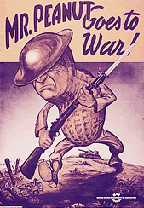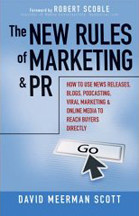If there is a tipping point between viral fun and crisis communication, CBS seems to have found it. As if a battle with The National Association of REALTORS over a CBS "60 Minutes" story isn't bad enough, the network is trying desperately to prevent an all-out war with its own customers, viewers who became enamored with the television series "Jericho."
Originally, Nina Tassler, president of CBS Entertainment, took the hard view, telling the Vancouver Sun and other media outlets ... "that show would still be on the air if the audience was there. No programmer wants to p.i.s.s. off their audience. When that happens, it's unfortunate. Part of what we try to do is create viewer loyalty, and then build on that ... But we're running a business."
Today, on CBS Jericho message boards, her bluntness has been dulled and her talk-tough approach humbled.
"Please know that canceling a television series is a very difficult decision ... It is a show we loved too. We truly appreciate the commitment you made to the series and we are humbled by your disappointment. In the coming weeks, we hope to develop a way to provide closure to the compelling drama that was the Jericho story."
What changed? A combination of viral fan campaigns that demonstrate the relative ease of organizing an army of angry customers online. The site includes all CBS phone numbers, e-mails, and addresses; affiliate and advertiser contact information; links to an online petition growing by 10,000 viewers a day; sample letters; show ratings; and even links to other networks to encourage them to buy Jericho.
On any given show cancellation, maybe a single viral idea might stick. Not so with Jericho. In addition to the NUTS campaign we reported on yesterday, fans have been busy.
They have made fax sheets, T-shirts, and posters featuring CBS "nuking" the show; added links to where you can order "nuts" online; solicited celebrities; threatened CBS boycotts; spammed other show message boards (resulting in scores of CBS fans being removed from the CBS Jericho site); and dozens of other ideas, many of which are being promoted on the CBS Jericho message boards and hundreds of blogs.
The fallout being caused by hundreds of thousands of viewers (a fraction of millions who watched it) and CBS is one that all major networks can take note of: show promotion and social media represent a double-edged sword. It may increase viewership and buy-in but it also evolves viewers into customers.
Ratings conducted by Nielsen are no longer the only measure of a fan base. Consumers are recording their favorite shows in record numbers; watching full episodes with an online platform that, ironically, CBS provided; or waiting to catch up when an entire season is released on DVD. Personally, I'm surprised Tassler and her staff didn't factor this, along with the fanaticism of fans they did create, into the equation. First run ratings are seemingly becoming one of the least effective measures for successful programming.
The mistake, what some are calling the worst cancellation error in television history, is taking a major toll on CBS. Enough so that the latest rumor is that if CBS doesn't release the show to another network, it may produce a 2-hour series finale to tie up loose ends.
I'm no longer convinced it will work. The finale idea might have been successful a few days ago, but now organized fans seems less willing to settle after being ignored then talked-tough too then booted from CBS message boards and now seemingly placated by the executives. Tensions are so high that even CBS affiliate Eyewitness News 12 in Kansas has defected to the customer camp.
In sum, this entire event is demonstrating that passive viewers have evolved into active customers. As such, networks might think twice about going to war against them. Such wars only make advertisers and shareholders extremely anxious, nervous, and less than impressed.

Originally, Nina Tassler, president of CBS Entertainment, took the hard view, telling the Vancouver Sun and other media outlets ... "that show would still be on the air if the audience was there. No programmer wants to p.i.s.s. off their audience. When that happens, it's unfortunate. Part of what we try to do is create viewer loyalty, and then build on that ... But we're running a business."
Today, on CBS Jericho message boards, her bluntness has been dulled and her talk-tough approach humbled.
"Please know that canceling a television series is a very difficult decision ... It is a show we loved too. We truly appreciate the commitment you made to the series and we are humbled by your disappointment. In the coming weeks, we hope to develop a way to provide closure to the compelling drama that was the Jericho story."
What changed? A combination of viral fan campaigns that demonstrate the relative ease of organizing an army of angry customers online. The site includes all CBS phone numbers, e-mails, and addresses; affiliate and advertiser contact information; links to an online petition growing by 10,000 viewers a day; sample letters; show ratings; and even links to other networks to encourage them to buy Jericho.
On any given show cancellation, maybe a single viral idea might stick. Not so with Jericho. In addition to the NUTS campaign we reported on yesterday, fans have been busy.
They have made fax sheets, T-shirts, and posters featuring CBS "nuking" the show; added links to where you can order "nuts" online; solicited celebrities; threatened CBS boycotts; spammed other show message boards (resulting in scores of CBS fans being removed from the CBS Jericho site); and dozens of other ideas, many of which are being promoted on the CBS Jericho message boards and hundreds of blogs.
The fallout being caused by hundreds of thousands of viewers (a fraction of millions who watched it) and CBS is one that all major networks can take note of: show promotion and social media represent a double-edged sword. It may increase viewership and buy-in but it also evolves viewers into customers.
Ratings conducted by Nielsen are no longer the only measure of a fan base. Consumers are recording their favorite shows in record numbers; watching full episodes with an online platform that, ironically, CBS provided; or waiting to catch up when an entire season is released on DVD. Personally, I'm surprised Tassler and her staff didn't factor this, along with the fanaticism of fans they did create, into the equation. First run ratings are seemingly becoming one of the least effective measures for successful programming.
The mistake, what some are calling the worst cancellation error in television history, is taking a major toll on CBS. Enough so that the latest rumor is that if CBS doesn't release the show to another network, it may produce a 2-hour series finale to tie up loose ends.
I'm no longer convinced it will work. The finale idea might have been successful a few days ago, but now organized fans seems less willing to settle after being ignored then talked-tough too then booted from CBS message boards and now seemingly placated by the executives. Tensions are so high that even CBS affiliate Eyewitness News 12 in Kansas has defected to the customer camp.
In sum, this entire event is demonstrating that passive viewers have evolved into active customers. As such, networks might think twice about going to war against them. Such wars only make advertisers and shareholders extremely anxious, nervous, and less than impressed.






















